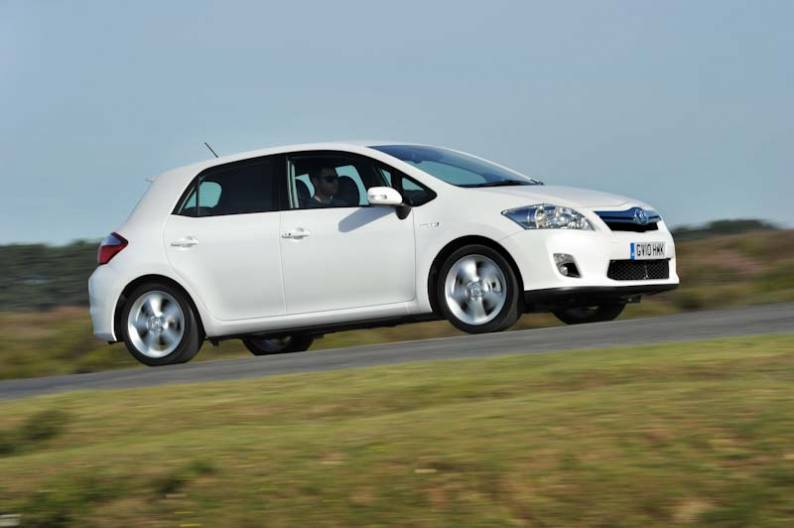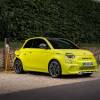
RAC sale – up to 33% off*
• Roadside cover from £5.29 a month†
• We get to most breakdowns in 60 mins or less
• Our patrols fix 4/5 breakdowns on the spot

By Andy Enright
Introduction
At its launch in 2010, the Toyota Auris hybrid's importance lay less in the HSD (or Hybrid Synergy Drive) technology it carried - that was simply borrowed from Toyota's existing Prius - and more in the fact that this was the first time we'd seen such a futuristic powertrain so affordably and un-showily deployed in an ordinary family hatchback. Virtually identically to its conventional petrol and diesel siblings, here was a car that didn't shout its owner's green credentials from the rooftops. Here was the first real stage of the Toyota masterplan - to take hybrid motoring mainstream.
No more optimistic premium pricing based on buying into vague celebrity-driven notions of eco-friendliness. This was hard-nosed hybrid motoring that confronted the diesel establishment head-on, offering a compelling package too sensible for family hatchback buyers to ignore. That was Toyota's take. But was the market ready for it? Sales weren't exactly stratospheric, but there are some very well looked after used examples on the market. Here's how to track one down.
Models
5dr family hatch (1.8 petrol/electric hybrid [T4, T Spirit])
History
The Auris took over the mantle from the Corolla back in 2007 but it wasn't until 2010 that the Auris HSD made its very low-key appearance. It marked the first of a new breed of hybrids, namely one that took this mind-bending petrol/electric technology and made it seem an everyday thing. It seems strange to think of it now, but thirty years ago, buying a diesel-engined car wasn't so very different in the statement it would make to the neighbours as buying a hybrid model is today. Buying a diesel back then marked you out as someone for whom low running costs and high efficiency were clearly priorities over performance. But diesels became commonplace, unremarkable and an obvious option on every mainstream family car. That's the direction the Auris HSD pointed us in back in 2010. And it was prescient too. Fast forward to today and you can buy all manner of hybrid vehicles that are identifiable only by a discreet badge on the back. The technology has truly been democratised.
Toyota only sold the Auris HSD in the top T4 and T Spirit trim levels, recognising that someone really looking to cut costs would always be better served smoking about in a poverty-spec diesel model. So you're not going to go shy on equipment. The other upside of that is that most owners have the funds to look after their cars properly. This model Auris HSD wasn't actually on sale for too long, the replacement arriving at the end of 2012.
What You Get
Whichever Auris Hybrid you choose, you should find equipment levels to be reasonable for the money being asked. Expect to find a 6-speaker MP3-compatible CD stereo with steering wheel-mounted audio controls and USB connectivity, alloy wheels, hill-start assist control, an ant-glare driver's rear view mirror, air conditioning, a trip computer and daytime running lights. Safety-wise, you can expect to find anti-whiplash head restraints, twin front, side and curtain airbags (plus a 'bag for the driver's knee), ISOFIX fittings for rear child seats, as well as the usual braking aids, plus stability and traction control.
What You Pay
Please fill in the form here for an exact up-to-date information.
What to Look For
You are joking, right? In all seriousness, very little goes wrong with the Toyota Auris HSD. Look for the usual parking scuffs and scraped alloy wheels. Check the wear on tyres for signs of suspension misalignment and check that the car has been regularly oil serviced. Otherwise, there's not really much else to worry about. The interiors have proven hardwearing, although the one moan existing Auris owners repeat about their cars is that the complex dashboard mouldings can creak and rattle. This model Auris was launched after Toyota's sticky accelerator pedal recall, so nothing to worry about on that score.
Replacement Parts
(approx based on a 1.8 five-door T4) Parts are pitched a little above what you'd expect to fork out for Vauxhall or Ford spares but Toyota would counter that you'll need to buy them less often. A replacement headlamp unit will cost in the region of £245, whilst an exhaust is around £450. Tyres are around £80 a corner.
On the Road
Take a seat behind the wheel and, as usual with a hybrid, there's a bit of mental adjustment necessary before it all becomes second-nature. Push the round 'Start' button and flick the little blue CVT gearbox lever into D (hybrids are always automatic) and there's just silence. Your first reaction is to push the button again, but no, this is how it is. Which is rather odd, not only for you but for adjacent pedestrians who can sometimes be caught out by the stealthiness of your approach. In theory, assuming the batteries are charged, this Prius will run in electric-only guise at speeds of up to 31mph and will remain in milk float mode for up to 1.2miles if you select the 'EV' (Electric Vehicle) option from the button behind the gear stick.
Even hybrid drivers though, must shed their eco-friendliness some of the time. When you're running late for example and need all the petrol/electric system's combined 134 horses. This is when you'll choose the 'Power' option which, if you put up with the thrashy engine note as the engines powers through the CVT gearbox, will see the rest to sixty sprint occupy 11.4s - just half a second slower than a 1.6-litre petrol Auris - on the way to a 112mph maximum. That's not quite as quick as Toyota's Prius hybrid, but it's quite fast enough to keep pace with comparable diesels. And, though this still isn't a set-up calculated to please any kind of driving enthusiast, you'll enjoy the whole thing more than you would in a Prius thanks to sharper steering, a better ride and reduced body roll.
Overall
The Toyota Auris HSD is a genuinely smart used car buy. In fact it's one of the best used purchases a family buyer can make. It's reliable, clean, economical, practical and safe, with a cabin that still feels fresh and modern. If you're really intent on keeping track of every penny, an Auris diesel will cost less, but the HSD feels a more special piece of kit. It's not a car that jumps up and twangs any emotional chords. Instead it's a grower, a car that slips effortlessly into your pace of life. It's subtle, considered, rather cerebral and unexpectedly lovely. It could well be the family back up vehicle that you'll find really tough to replace.





![Toyota Prius [XW10] (2000 - 2003) used car review](https://d1ix0byejyn2u7.cloudfront.net/drive/images/made/drive/images/remote/https_d2yv47kjv2gmpz.cloudfront.net/filestore/3/3/0/1_151d2df5b96b80c/bfafea29083456eb227f0f61bd6ccc68/1033_0ca66e7cfb73706_100_100_70_c1_c_c.jpg)

